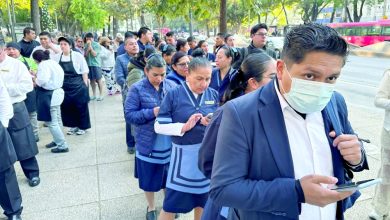Climate protesters rally in Brazil at COP30 halfway mark
BELEM, Brazil: Thousands of people marched through the streets of Belem on Saturday to press for action from negotiators holding tough talks at the UN’s COP30 climate conference in the Amazonian city.
Under a baking sun, Indigenous people mixed with activists gathered in a festive atmosphere, blasting music from speakers, carrying a giant beach ball of Earth and holding a flag of Brazil emblazoned with the words “Protected Amazon.”
It was the first major protest outside the annual climate talks since COP26 four years ago in Glasgow.
Branded the “Great People’s March” by organisers, the Belem rally comes at the halfway point of contentious negotiations and follows two Indigenous-led protests that disrupted proceedings earlier in the week.
“Today we are witnessing a massacre as our forest is being destroyed,” Benedito Huni Kuin, a 50-year-old member of the Huni Kuin Indigenous group from western Brazil, said.
“We want to make our voices heard from the Amazon and demand results,” he said. “We need more Indigenous representatives at COP to defend our rights.”
Tyrone Scott, a 31-year-old Briton from the anti-poverty group War on Want, said it was an “Indigenous-led, movement-led, people-powered march.”
“It’s just really exciting and a little bit of a nice antidote to the staleness and sterility of the inside of the COP,” Scott said.
Their demands include “reparations” for damage caused by corporations and governments, especially to marginalised communities.
Inside the venue, talks are delicately poised.
At the close of the first week of negotiations, the Brazilian presidency of COP30 is expected to unveil its strategy on Saturday for reconciling countries’ demands.
The top issues include how to address weak climate goals and how to improve financial flows from rich to poor countries to build resilience against a warming world and transition to low-emission economies.
So-called trade barriers, such as Europe’s carbon border tax, have emerged as a key contention, as has the issue of whether to set timelines and targets for the transition away from fossil fuels.
Several participants believe that negotiators are holding firm to their positions while awaiting the arrival next week of government ministers, who must reach an agreement by the conference’s end on November 21. An African negotiator hoped the presidency would take the lead, “otherwise this could turn out to be an empty COP,” he said, contrasting with the optimism expressed by others. — AFP
